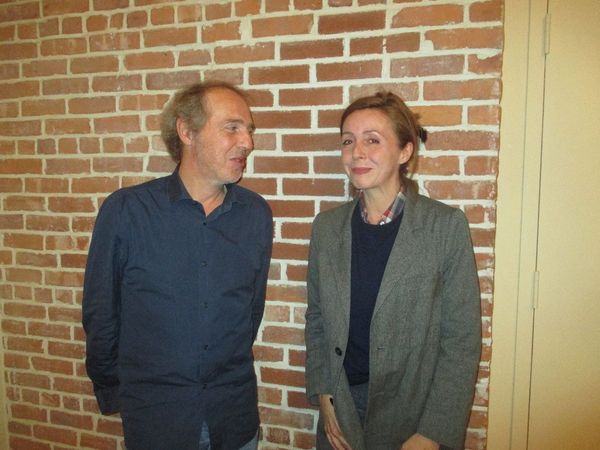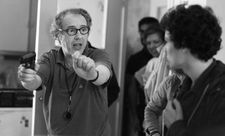 |
| Arnaud Desplechin of My Golden Days (Trois Souvenirs De Ma Jeunesse) directs Anne-Katrin Titze Photo: Sara Sampson |
Mathieu Amalric, André Dussollier, Lou Roy-Lecollinet, Quentin Dolmaire, Antoine Bui, Cécile Garcia-Fogel, Olivier Rabourdin, Irina Vavilova, Françoise Lebrun, Dinara Drukarova, Raphaël Cohen and Lily Taieb make My Golden Days burst with life.
How André Dussollier becomes a smiling Ernst Lubitsch devil out of Heaven Can Wait, location scouting in Roubaix, green Alfred Hitchcock scissors, New York Film Festival director Kent Jones's Hitchcock/Truffaut, Chekhov's Uncle Vanya, and Roman Polanski's Tess d'Urbervilles became part of my animated conversation with Arnaud.
 |
| Dédalus (Mathieu Amalric) questioned by agent (André Dussollier) |
We spoke about François Truffaut's Mississippi Mermaid (La Sirène Du Mississipi), Esther’s siren song and Paul’s knightly mourning, how Stanley Cavell and John Ford make for a good epilogue, and why Arnaud no longer writes small talk but does dance choreography.
Three defining chapters in the youth of recurring Desplechin hero, Paul Dédalus (played by Mathieu Amalric in his adult form), make him live up to his name - both as mythical constructor of the labyrinth and the wings to escape it, and as Joyce's alter-ego set to take flight. After an episode titled Childhood, (Paul as a little boy is played by Antoine Bui) appropriately spotty and pointed, as early memories tend to be, the chapter called Russia twists the hero (Quentin Dolmaire) into a Cold War teenage spy story.
Part three is the story of a great love and the conflicts of an anthropologist. Esther (Lou Roy-Lecollinet) takes up all the memory. Carefully chosen details speak volumes. Partly chewed-off pink nail polish talks unobtrusively of self confidence and dread. A black armband, five years after a death signals a loss unmourned. The epilogue is a wonderful showdown and an epic, verbal confrontation about the nature of integrity.
 |
| Quentin Dolmaire as Paul: "Three times in the film he is saying, 'I don't care about my mother'." |
A nameless agent played by André Dussollier, as if he were a deity from a Lubitsch designed netherworld, talks with Dédalus about his "twin" and a high school trip to Minsk.
Anne-Katrin Titze: I was thinking how much the three memories you picked matched the chosen genre. When we remember childhood, it is often pointed, with short scenes and sudden cuts to the next memory. Early adolescence is an adventure story.
Arnaud Desplechin: Yes, it also has to do with the story that you love to tell about yourself. It's the legend. The moment of your life where you are dressing your own legend. I've been the guy who did that! It's this moment of invention of yourself.
AKT: Exactly, it is our wish fulfillment as the adventurer. And next comes the love story with longing that makes for the longest episode. And then you have those fascinating scenes with André Dussollier. They reminded me of Lubitsch. He is like one of those mysterious netherworld characters. I am thinking for example, about the devil in Heaven Can Wait [coincidentally in the New York Film Festival Revivals section].
 |
| Paul Dédalus (Quentin Dolmaire) Esther (Lou Roy-Lecollinet): "I will be your fate." |
AD (laughing): Yeah, actually, that's it. Very clearly.
AKT: Did you think of that?
AD: Actually, yeah. No, I didn't think of that. But I see this Lubitsch film so clearly. And this figure of the devil was a smiling one. A very friendly devil. Waiting and pushing you to the limit and trapping you. You know, there is something almost comical. In fact, the guy [Paul played by Almaric in My Golden Days] is free, he has a small problem - we don't see the plane boarding but we can see him walking out of the plane - there is a small problem with his passport. And suddenly he is in jail! With the devil! Paul asks: "Who are you?" And the guy is saying: "Aah, no, I can't answer that question." There is a comical aspect that André Dussollier was able to [purvey] - to be threatening and to be charming at the same time.
AKT: The benevolent Devil, all-powerful and smiling, the ultimate movie authority. I was not only thinking of this Lubitsch devil, but deities and angels from classic Hollywood heavens played by Otto Kruger or Claude Rains. Dussollier enters that realm. I love that he is interweaving the story lines. I want to talk about one of the locations that has such magic. The home of Esther's parents with the big green Freudian scissors outside. The rolls of fabric everywhere, workspace and home intertwined, I loved that place. How did you get to this?
 |
| Lou Roy-Lecollinet as Esther: "I mean, come on, you're 17 years old, you should dance!" |
AD: I loved it. We didn't know. There are some things… Anything that belongs to common life or naturalism, in my films I'm not writing it any longer. What I mean by that is that all the small talk, like, if we start a scene "Hello, how are you? Would you like some coffee, Anne-Katrin?" Or whatever. All these lines, I'm not writing them anymore. If I need them during the shooting, okay I am writing them [he scribbles in the air in front of me] and giving you the lines and we improvise that. So things like the work of her parents, I didn't write it properly.
I said, they had a little more money than Paul's, not much, they are a little bit wealthier but I don't know their job. Because I can't film in a studio - you know that - I have to film on location. So after that we visited so many places in Roubaix, where I needed to have the house for the scene with the mother yelling downstairs. I needed this specific geography. So I visited florists, I visited places of all the work possible that I could think of. And finally there was a place which was not exactly the same but there was a magic with all those pieces of fabric. Because that's the old ancient industry of Roubaix, when it was still a rich town.
AKT: Oh, wow, I didn't know that.
 |
| Arnaud Desplechin acting for Quentin Dolmaire: "That way, they have the grace and I have the embarrassment." |
AD: It was the fabric, you know. I was working with the art department and they told me about the place we picked. We worked in that place and we fixed up an apartment amongst the shop. We just fixed a few things. And obviously, thinking about that green light, I was trying to find something for a scene. So I asked, could we have a green sign? You know, it's the Vertigo thing. It always works. It's just like in Vertigo, if we have some green light coming from the window…
AKT: It works really well.
AD: We know it works because of Vertigo. So they proposed different things to me. Because it was fabric, they proposed me the scissors. It's so perfect! The castration, it's so perfect! Let's have the scissors!
AKT: At the first meeting between Esther (Lou Roy-Lecollinet) and Paul (Quentin Dolmaire), she tells him "You'll never forget me." What a line to say. And memory is already included.
AD: She is so audacious, isn't she? You will never forget me! Why? Because I'm exceptional. I'm not like your dumb friends who are able to talk blah, blah, blah. I don't say a thing, and you'll never forget me! I will be your fate. All the film is dealing with the fact that this guy is lost in his memories. At the beginning of the section of Esther, Paul is saying, Mathieu is saying with the voiceover, "I don't remember a thing." Bits and pieces, rags and bones, it's just a stuttering. But amongst the stuttering, there is one thing, which is THE thing, which is Esther. Esther took up all the room in his memory.
 |
| Quentin Dolmaire Lou Roy-Lecollinet: "Esther took up all the room in his memory." |
AKT: There is a detail I noticed during the initial meeting. Esther's nail polish is chipped, which would be the cause of some embarrassment for many people, but not for her.
AD: Not for her. She is proud of it.
AKT: She can take on the stereotype of the blond small-town siren and completely go beyond that. Another detail that intrigued me is Paul's black arm band, that he wears in mourning for five years. At the same time, he insists, "I never loved my mother."
AD: It's strange, there is this trail about the mother. Three times in the film he is saying, "I don't care about my mother. The fact that she died, I'm not affected by that. It didn't do a thing." I think, if you are saying it three times in a film, it could have affected you? You could lie a bit, without knowing it. I love the gesture. Usually, when you see a knight in a film, he is wearing something here [he points to his sleeve] from a princess. You know what I mean?
AKT: The beloved's handkerchief.
AD: Yeah, a handkerchief or something like that. In this case, when he will go for the adventure as a knight, to the back room of the synagogue, he says, "no, I don't care" and he is taking the armband and he is getting rid of it. So now he is ready to live and stop this endless mourning. I love the fact that he is saying "I don't mourn my mother" and actually wore that for five years, which is quite long.
AKT: And his sister wears the mother's pearls and doesn't take them off. And then there's the little brother who has to plot bank robberies because there's no necklace or armband for him to signal his pain. Is that it?
AD: Yeah. That's a nice drawing.
AKT: Esther dances like a silent movie star. Did you choreograph it this way?
AD: And it's not in slow motion! It's something that we did collaborating, Louise [Roy-Lecollinet] and me. The look when the camera is on her, I remember when we did one shot, which was a wider shot with this dance. Louise was strange, she is a strange girl, very interesting girl, this actress. She was saying "no, I don't dance. Actually, I don't like to dance." And I was answering to her "how can you say that? I mean, come on, you're 17 years old, you should dance! You have to enjoy it! You have to have pleasure with that!" And so we took dancing lessons, Esther [!!!] and I. And I did the choreography. It's a depiction of my work. Often I am acting in front of the actors to show them how to do it and take the embarrassment on my shoulders. That way, they have the grace and I have the embarrassment. I am the ridiculous one and they are the glorious one.
AKT: Jean Renoir always acted out everything for the actors, too.
AD: I don't know. But I know that when I have to ask the actors to do something difficult, plus they are younger than me, and they are reluctant, so I'm doing it. If you ask me, as an actor I'm terrible, I can assure you that, but on my set, I feel just free. Working on this with this dancing teacher, I improvised this dance with a few of my movements. She was imitating me, I was imitating her and we invented that. And strangely enough, it's an image not coming from a film from the Eighties, but coming from the Twenties, as a silent movie dance, as if it was in slow motion. It's a perfect moment.
AKT: It is. The argument you just gave is related to the one Paul tells his professor - "You need a less brilliant student." Take me! It's the best one I've heard to get into a class. In the Epilogue, there is a wonderful dialogue, that I couldn't write down fast enough during the press screening. In the scene, Paul breaks with this awful male bonding rule that is so encoded. It's wonderful and I am sure many women will appreciate this. The fact that he exposes his pal's behavior. But there is also his question, something like, "have you learned nothing from all the movies we used to watch?" that interests me. What exactly does he say?
AD: He is saying a very Cavellian line, you know, like Stanley [referring to the philosopher Stanley Cavell]. Translated to English, he is saying: "And I don't see how you allow yourself to be that ignorant about a moral which has been taught you by the most popular films, the films that we were watching on TV, in the cinema. I don't see how you allow yourself to be that ignorant." That's the line.
AKT: Thank you. That's the one. It's very intriguing to use that in a scene that also speaks of a less heroic male bonding.
AD: It's perhaps because it recalls to us the scene with the John Ford movie. When you could see the Indians and the Cowboys. When you could see the rules. What are the rules? The rules are: Paul stole Esther from a previous guy. The guy is waiting for him in front of the red car outside in the street and the brother and the sister are looking at the three guys and say "I think they are waiting for you, they want to kill you." What is Paul doing, very bravely? He puts on his boots, his coat, saying, okay, I accept it. Perhaps I'm not good at fighting, but I'm good at being beaten.
Coming up: Roman Polanski's Tess d'Urbervilles, looking forward to Kent Jones's Hitchcock/Truffaut, a Chekhovian scene, François Truffaut's Mississippi Mermaid, a theory from our previous conversation including the Under Capricorn complex.
My Golden Days will screen at the London Film Festival in the Love section.





















